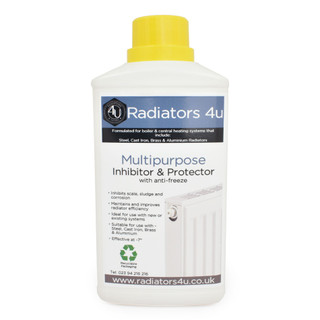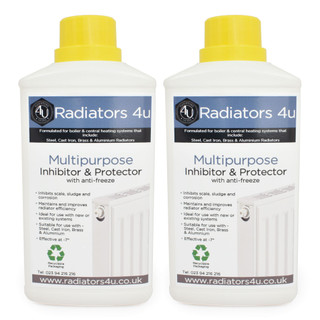How To Avoid Corrosion In Aluminium Radiators
Posted by Radiators 4u on 16th Sep 2020

How To Avoid Corrosion In Aluminium Radiators
With any central heating system, corrosion is going to be a concern. Steel has traditionally been the most popular choice of material for a radiator due to its low price and high heat retention, however, rust could be a continued worry for homeowners with steel radiators.
Steel radiators will rust over time introducing a debris of rust into the heating system. In the long term, this will weaken the radiator itself eventually forming tiny holes in the radiator causing leaks, meaning it will need to be replaced. Aluminium differs from steel as it doesn't rust in the same way. Aluminium is a reactive metal, therefore, oxidation happens when the metal comes into contact with oxygen. This means that if the outer surface of an aluminium radiator comes into contact with air, corrosion will begin. The outer surface of an aluminium radiator is always coated in paint, therefore the aluminium itself won’t come into contact with oxygen. If it should, for example through small scratches overtime on your radiator, a new layer of aluminium oxide will form which protects the metal underneath, protecting your radiator.
Then why the concern? Despite rusting not being an issue when purchasing an aluminium radiator, galvanic corrosion can be an issue internally. Galvanic corrosion takes place when two electrochemically different metals are in contact with one another through a liquid. During this process, one metal will function as an anode, one as a cathode, while the liquid acts as an electrolyte causing a galvanic cell to form. This cell will then corrode one metal at the expense of the other.
A central heating system will usually have a mix of metals; copper pipes, brass radiator valves, and radiators themselves made of steel, cast iron, or aluminium. These materials will not all be touching one another, however with the liquid in your radiator acting as an electrolyte, one metal may corrode. Which metal corrodes depends entirely on which is more "noble" of the two. The greater the difference in nobility between the two, the faster the corrosion could take place.
Preventing galvanic corrosion in Aluminium Radiators is far more simple than you may think. We recommend using an inhibitor, a liquid formula used to prevent corrosion in domestic heating systems. This formula, such as Fernox F1, can simply be added via the feed and expansion tank for open vented systems or directly into the radiator using an injector for sealed systems. As well as preventing corrosion, inhibitors can protect against limescale formation, ideal for homes in hard water areas such as ours here in Portsmouth. Not using an inhibitor can be an issue as it may void the warranty with some aluminium radiators, making it even more important to have.






